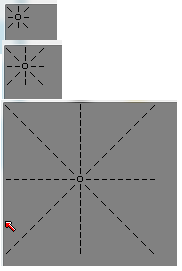43
7
Write a program that takes in (via STDIN/command line) a non-negative integer N.
When N is 0, your program should print O (that's capital Oh, not zero).
When N is 1, your program should print
\|/
-O-
/|\
When N is 2 your program should print
\ | /
\|/
--O--
/|\
/ | \
When N is 3 your program should print
\ | /
\ | /
\|/
---O---
/|\
/ | \
/ | \
For larger N, this pattern continues on in the same exact fashion. Each of the eight rays of the "sun" should be made of N of the appropriate -, |, /, or \ characters.
Details
- Instead of a program, you may write a function that takes an integer. The function should print the sun design normally or return it as a string.
You must either
- have no trailing spaces at all, or
- only have enough trailing spaces so the pattern is a perfect (2N+1)*(2N+1) rectangle.
The output for any or all N may optionally have a trailing newline.
Scoring
The shortest code in bytes wins.

Is a leading newline allowed? Especially interesting for
N=0. – Jakube – 2015-05-07T23:10:49.310@Jakube No. Trailing only. – Calvin's Hobbies – 2015-05-07T23:12:20.617